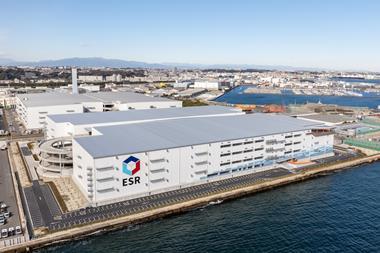Lessons were learned by the Japanese property market after the banking crisis of the 1990s, but can they be applied to the UK property market as it feels the impact of the credit crunch? Angus McIntosh reports
The extraordinary boom of rampant bank lending to speculative commercial development in the 1980s sent rents in Tokyo soaring from 30,000 tsubo yen per month in 1984 up to a peak in 1990 of 70,000 tsubo yen per month - a 230% increase in only six years. In London, West End rents moved up from £25/ft2 per month in 1884 but peaked two years earlier than Tokyo at £70/ft2 in 1988. They had risen by 280% but remained unchanged for the next few years.From the peak of 1990, office rents in Tokyo fell steadily and by 1994 were back at 30,000 tsubo yen per month, a fall of more than 60% their peak.Meanwhile, London's West End rents eventually fell from £70 to £40/ft2 - a 40% fall that was certainly less dramatic than the one seen in Tokyo.The Japanese property market then stalled: rents did not rise significantly between 1994 and 2004; they crept up to 40,000 tsubo yen per month. Eventually, on the back of the Chinese induced economic growth, Tokyo office rents eventually increased by another 10% to 45,000 tsubo by 2008, but they were still some 35% below their peak in 1990. By 1996, office rents in the West End had started to increase. Having grown by 7% that year, they then increased to £70/ft2 by 2000 and moved upwards to a peak of £110/ft2 in 2008. By now, they were 50% more than they had been at their peak in 1990, in stark contrast to the Tokyo experience.Why these differences? The two markets clearly behaved in a different way. The Japanese post-war economy had been a true success story but the Japanese population was encouraged to save. Furthermore, the Japanese property market was, at best, opaque. While the manufacturing economy grew enormously, the service sector did not grow in the same way it had in London and New York. When the downturn came with the collapse of the economy in 1992, the reaction in Japan was to save rather than consume. Savings, as a percentage of income rose to around 20%, and no amount of government encouragement, including the lowering of interest rates and other incentives could persuade consumers to spend money and stimulate the economy. It was not until the Japanese economy decided to adopt real estate investment trusts (REITs) that the property market began to change. Introducing this tax neutral structure was a deliberate strategy to make the market more transparent and provide regular valuations, based upon market evidence, although this did not have an impact on the property market until after 2000.In London, one of the most transparent property markets in the world, the boom and bust of the 1980s was followed by one of the more rapid recoveries anywhere in the western world. By 1994, the London economy had begun to accelerate and rents started to increase. London found itself in a pivotal role in the world economy, its role as the international banking city was strengthened, and it eventually overtook New York. After 1990 unemployment rose dramatically - in Japan it rose from 2% up to 8% and in the UK it reached 10% in 1992. It eventually fell in the UK during the 1990s while remaining relatively high in Japan for more than a decade.
So are there any similarities? Yes: excessive lending to the property market. In Japan this took the form of lending for Japanese speculative commercial development in the 1980s; in the UK for speculative residential purchases in 2000. There are also clear transparency issues: by creating ‘off-balance sheet' securitised instruments, the UK banking sector - as with the US banking sector - not only lost control of its liabilities but by the beginning of 2008 many banks still did not fully understand the debt liabilities they had created in the previous three to five years, while bank debt was similar to the levels created in Japan in the 1980s.High levels of bank debt are unlikely to be eroded by inflation, especially if the central banks continue to focus on controlling inflation by raising (or not reducing) interest rates. This dilemma faced Japan in the early 1990s: inflation remained at remarkably low levels, meaning that inflationary values in the economy were unable to erode levels of debt. While in 1990 Japanese inflation had briefly reached almost 4%, it remained at 1% or lower (and sometimes was in negative territory) from then on, right through until 2008.In the UK, inflation fell from around 8% in 1990 and has been consistently around 2-3% since, although it has increased beyond 4% this year. But unlike Japan, much stronger economic growth and low interest rates in the UK have enabled the overall cost of debt to diminish.To some extent both the banking crisis of 1990 in Japan and that of the UK in 2008 can be blamed on very active monetary policy, coupled with financial deregulation and privatisation. Institutional structures have not been in place to prevent irresponsible bank lending. The sub-prime residential lending in the US, and the sale of ‘off-plan' apartments in the UK using debt finance, epitomise this financial irresponsibility.Furthermore, in the present climate, monetary policy is unable to prevent the inflation impact of extraordinary commodity price rises, with oil and food in particular having grown by more than 50% in the last 12 months. Just as the lowering of Japanese interest rates to almost zero in the 1990s had almost had no impact on the economy, recent moves to reduce interest rates have had very little impact on the cost of money. The London Inter Bank Offered Rates (LIBOR) has remained stubbornly high, sometimes 1% higher than the official Bank of England base rate.And the outlook? In the short term it could be suggested that the scarcity and cost of credit in the UK is similar to the problems seen in Japan throughout the 1990s. In both situations banks appear to be in denial that their liabilities are almost out of control.
But in the medium term, the transparency and flexibility of the market means the UK banking system is likely to return to normal, and economic growth to return to more than 2% growth per annum. That the UK economy and its property market will stall for a decade - as in Japan - is far less likely.
Angus McIntosh is partner and head of research at King Sturge, London, and visiting professor at Oxford Brookes University












